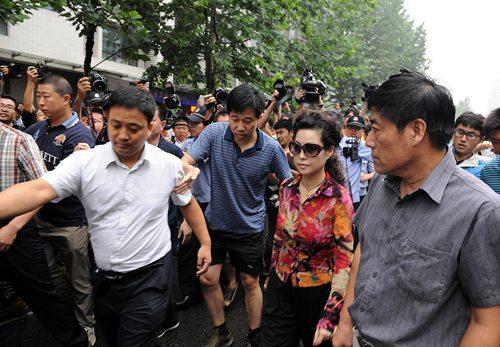|
 |
|
UNDER THE SPOTLIGHT: Meng Ge (second right) on August 28 attends the trial of her 17-year-old son who was charged for his involvement in a gang rape case that occurred in February (HE JUNCHANG) |
On August 29, the trial of a high-profile gang rape case in Beijing concluded. In the months leading up to the trial, the case, which involved the son of a famous Chinese singer, attracted a great amount of attention from the media and the public.
Meanwhile, the debate over the privacy of juvenile offenders was also brought to the forefront of public discourse by experts who raised concerns over the publicity of the case. Some claimed that the relentless media reports and online sharing of every-minute detail of the suspect infringed on his right to privacy, particularly since he is legally still a minor.
On February 21, the Public Security Bureau of Beijing's Haidian District said that five young men had been detained under allegations of gang rape. All five suspects were only identified by their surnames, as guaranteed by police, due to concerns over their privacy.
However, within hours, it was reported that anonymous police insiders had confirmed one of the suspects was the 17-year-old son of a prominent singer and public figure. The case immediately became sensationalized in the media and on the Internet.
With public interest in the case growing continuously, especially after the prosecuting authority filed rape charges against the five suspects, more and more personal information regarding the juvenile offender Li surfaced online and in the media, including photographs, the schools he studied at and even his nicknames.
Liu Xiaoyuan, a lawyer with the Beijing-based Fei Rei Law Firm, believes that the actions of media outlets and the netizens in releasing the personal information of the juvenile Li has violated the article in the Law on the Protection of Minors regarding privacy.
Article 58 of the law stipulates that with respect to cases involving crimes committed by minors, the names, residences and pictures of the said minors, or other material from which information about the minors can be deduced, may not be disclosed in news reports, films, TV programs or openly circulated publications or online.
"All people are equal before the law. No matter what family or background they come from, every minor deserves the right to privacy," Liu said.
Withholding information
In July, the Hunan-based newspaper Xiaoxiang Morning Post carried out a survey on the protection of privacy for young offenders. The results showed that out of the 679 respondents to the survey, 72.9 percent supported the public release of Li's information in spite of him still being a minor. Some respondents said that they worried that without public supervision, judicial injustice may occur during his trial.
"The root cause of this situation lies in public's mistrust of well-connected individuals," said Xu Zhongyuan, a distinguished visiting professor at Central South University in Changsha, capital of Hunan Province. "They fear that the network and resources available to Li's parents will allow them to interfere in the judicial process."
Cao Yanzhi, a professor at the Law School of Xiangtan University in Hunan, believes that celebrities must accept the relinquishing of some parts of their privacy due to their high social profile.
"When conflict occurs between the public's right to know and individual's right to privacy, privacy should give way to the reasonable requirements for information from the public," Cao said.
However, Cao admitted that the privacy of juveniles involved in criminal investigations should be protected. "The protection should not be overstated though. It must have limits," she added.
Cai Yijun, a professor at the School of Criminal Justice under the Shanghai University of Political Science and Law, insists that only the private information that concerns public interests can be released to the public.
"According to law, all kinds of private information irrelevant to public interests are within the range of privacy and should be protected by law," Cai said, adding that when concerning juveniles, the public have no rights to require any private information.
Yang Lixin, a professor at the Center for Civil and Commercial Law of Beijing-based Renmin University of China, thinks that minors' right to privacy is more important than the public's right to know. "When the public's right to know cannot be satisfied, the only thing we sacrifice is public supervision. However, when privacy is infringed, the thing we sacrifice is the future of our nation," he said.
| 